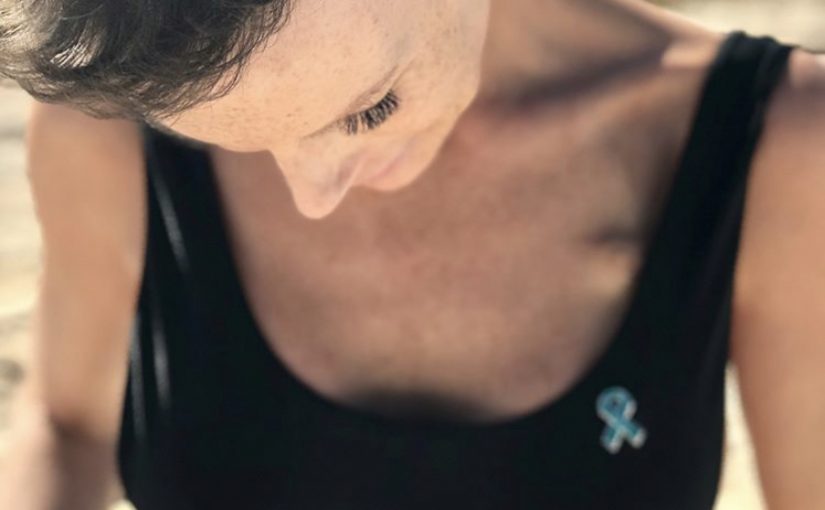My name is Taylor Cochrane, and I am a 35 year old mother, wife, and attorney living in Omaha, NE. On February 2, 2017, I was diagnosed with Small Cell Carcinoma of the Ovary, Hypercalcemic Type (SCCOHT). It is an extremely rare and highly malignant cancer, and I have been in remission since December 4, 2017. This is my story.
On June 1, 2016, our family was blessed with our second miracle, Penelope Kate, little sister to Reid Owen, our son. We had a beautiful delivery and were overjoyed to be a family of four. A few days after her delivery, I came down with a fever and chills that I couldn’t shake, and we ended up returning to the hospital. I went through a lot of testing to find the source of the infection, including a very thorough ultrasound of my entire pelvis – nothing. Despite being unable to find a source, I was placed on antibiotics, and sent home a couple of days later with a clean bill of health.
Then, in the late months of 2016, I began noticing bloating, a dull pain in my lower right abdomen, and I was also having pain with intercourse. I called my OB (thinking my IUD may have been the source), and she sent me up for an ultrasound the next day. This was the first of the “critical few” involved in saving my life: doctors who listened, and took timely action.
The ultrasound (on Thursday) revealed a 12cm mass on my right ovary. I was in surgery to remove it 4 days later (on Monday). My OB performed this initial surgery, and knew immediately it was cancerous. It would take almost two weeks to get the correct diagnosis on type, since it was so rare; but once we did, it was off to the races.
Things after that are a blur. Rushing to find oncologists who had treated this cancer – worldwide, there had only been about 250 cases at the time I was diagnosed. Rushing to determine the best treatment plan, as there was no standard. (Again, that super fun “orphan disease” thing!) Rushing get a port put in. Rushing to get a PET scan (which confirmed my staging). Rushing to start treatment. This was the second of my “critical few” – learning to, and becoming comfortable with, advocating for myself. This meant challenging timelines, asking questions, pushing for tests and answers, looking for alternative treatments to supplement my healing. We had to move fast – I had gone from no signs of cancer, to Stage 3C Ovarian Cancer in a matter of months. Treatment began on February 13, 2017, and included:
- Initial surgery to remove the tumor.
- Six rounds of a high dose chemo regimen (6 drugs infused over the course of 3 days on an inpatient basis in the hospital) at Methodist Hospital System in Omaha, NE. This was facilitated by my local Gynecologic Oncologist, Dr. Brent Tierney, and Dr. Kathleen Schmeler at MD Anderson. We also consulted with Dr. Joseph Pressey at Cincinnati Children’s.
- Second surgery to remove the other ovary and all affected lymph nodes.
- High Dose Chemo with Stem Cell Transplant with Dr. Julie Vose at the University of Nebraska Medical Center, guided by Dr. Joseph Pressey and team at Cincinnati Children’s.
I declined radiation after the stem cell transplant – I wouldn’t have lived through it. Which leads me to what I’ve learned through cancer, and another one of my “critical few” – you have to TRUST YOURSELF. It seems impossible, in a time when your body has seemingly betrayed you, and nothing feels safe anymore. But, I slowly learned to trust my instinct. One well respected institution refused to consider a stem cell transplant, saying there is no way I’d live through it. But I knew I needed to do it. Another one of my oncologists strongly encouraged radiation afterward – but I had to make the call not to. You will face these terrifying things as well, choices where your life literally may hang in the balance… and you will get through them.
Lastly, support. If there is anything that got me through, it was the support. So here’s the last of the “critical few” that really made an impact, it is finding your tribe, and loving them with everything you have. My husband, friends, family, strangers; so many people came together to help us get through this. But to you – my beautiful survivor – you also need to seek out other survivors. Talking to and leaning on those who really understood what I was going through was instrumental. I would have absolutely lost myself if it weren’t for the women I have connected with through this time.
From the day you are diagnosed, you are a SURVIVOR. From me you to – you’ve got this.


